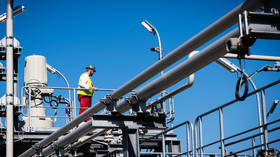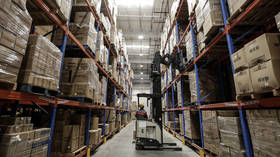Economist explains how ban on Russian oil and gas would affect Germany

Economist Daniel Stelter has warned that a possible boycott of Russian oil and gas in response to its offensive against Ukraine will badly hit Germany.
“Freezing Russian assets was a smart move. Nevertheless, not much has changed. Russia remains autonomous and still has revenue from oil and gas exports,” the founder of podcast Beyond the Obvious told Focus magazine on Sunday. “The bottom line is that there are now two options of what’s going to happen: the bad one and the very bad one.”
The first scenario is stagflation, rising prices amid a stagnating economy, Stelter argued, adding that sanctions and continued warfare will cause “a massive problem” for the food industry. “Russia and Ukraine account for around 25% of wheat exports, Ukraine accounts for around 90% of sunflower exports. Corn and barley also come from there in significant quantities,” the economist said.
Stelter pointed to the bread price hikes during the Arab Spring, the anti-government protests and riots in the Middle East in the early 2010s. “We must be careful that it doesn’t happen again. Because one thing is clear: a farmer in Ukraine has no time to cultivate his field if he must fight Russia at the same time.”
“Gas, coal and food prices will rise significantly. It worries me,” the economist said. The worst-case scenario will be a global boycott of Russian oil and gas, Stelter revealed.
“We’ll have a double-digit inflation rate, and our economy will collapse massively,” he argued.
Sanctions always hurt both sides – it’s ultimately a question of who hold out longer. And Germany will be hit hard because its dependence on Russia is disproportionately high.
Stelter said China has been stockpiling raw materials “while we hardly have any reserves.” He also noted close ties between Moscow and Beijing. “There is a big danger if more technology goes from China to Russia, and more raw materials go to China. I believe the biggest winner in a destabilized world will be China.”
“It’s tragic because we should have done everything we could to bring Russia and Ukraine closer to Europe. We can’t do it now.”
Many countries, including the US, UK, and EU member states, imposed sweeping sanctions on Russia, hitting its banks, among other things. The majority of European countries closed their airspace to Russian airlines, and Moscow responded in kind. Numerous major companies said they will suspend sales and services in Russia.
Russia attacked its neighbor on February 24, insisting that it was defending the Donetsk and Lugansk People’s Republic (DPR and LPR), which broke off from Ukraine shortly after the 2014 coup in Kiev. Moscow also said it was seeking “demilitarization and denazification” of the country, making it clear that it wanted Ukraine to officially become a neutral state that will never join NATO.
Ukraine said the offensive was completely unprovoked and denied the claim that it was planning to retake the breakaway republics by force.













